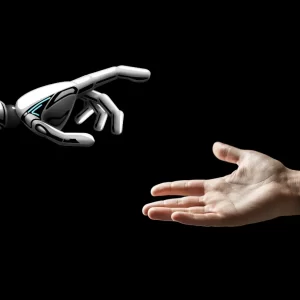AI in Marketing: The Future Is Now
Artificial Intelligence (AI) has ushered in a new era in the world of marketing, revolutionizing the way businesses connect with customers, analyze data, and optimize their strategies. As AI technologies continue to advance, they are becoming indispensable tools for marketers seeking to stay ahead in the ever-evolving digital landscape. In this article, we’ll explore how AI is shaping the future of marketing and why it’s a game-changer for businesses of all sizes.
Understanding AI in Marketing

1. Personalized Customer Experiences
AI-Powered Insights: AI systems analyze vast datasets, including customer behavior, preferences, and demographics, to create detailed customer profiles. By understanding each customer’s unique preferences and purchasing history, businesses can tailor their marketing messages and product recommendations for a more personalized experience.
Real-Time Personalization: AI enables real-time personalization of content and product recommendations. As customers interact with websites or apps, AI algorithms can adjust the content and offerings they see, increasing the likelihood of conversions.
Improved Customer Retention: Personalized experiences foster customer loyalty and retention. When customers receive offers and recommendations that resonate with their interests, they are more likely to return for repeat purchases.
2. Predictive Analytics
Data-Driven Decision Making: Predictive analytics powered by AI goes beyond historical data analysis. It forecasts future trends and customer behavior based on current data, enabling marketers to make informed decisions and adapt their strategies proactively.
Lead Scoring: AI-driven predictive models can assign scores to leads, helping businesses prioritize their sales efforts. This ensures that sales teams focus on leads with the highest conversion potential, increasing efficiency.
Reduced Churn: By identifying early signs of customer churn, AI can help businesses take preventive actions. This may include offering targeted promotions, personalized recommendations, or addressing customer concerns proactively.
3. Chatbots and Customer Support
24/7 Availability: AI-driven chatbots provide round-the-clock customer support, even during non-business hours. This availability ensures that customers receive assistance when they need it, improving their overall experience.
Efficient Issue Resolution: Chatbots are adept at handling routine inquiries and resolving common issues. This frees up human customer support agents to tackle more complex problems, improving overall service efficiency.
Scalability: Chatbots can handle multiple customer interactions simultaneously, making them ideal for businesses with growing customer bases. They provide consistent service quality regardless of the volume of inquiries.
4. Content Creation and Curation
Automated Content Generation: AI tools can generate content, including product descriptions, blog posts, and social media updates. While human creativity remains invaluable, AI can assist by automating repetitive content tasks, saving time and effort.
Content Recommendations: AI-powered content recommendation engines analyze user behavior to suggest relevant articles, products, or videos. This keeps visitors engaged and encourages them to explore more content.
A/B Testing Optimization: AI can optimize A/B testing by quickly analyzing large volumes of data to identify winning variations. This accelerates the optimization process and improves conversion rates.
In summary, understanding AI in marketing involves recognizing how artificial intelligence enhances personalized customer experiences, facilitates predictive analytics, transforms customer support through chatbots, and streamlines content creation and curation. AI is not a replacement for human creativity and expertise but a powerful tool that empowers marketers to deliver better-targeted campaigns, make data-driven decisions, and improve customer interactions. As AI technologies continue to advance, their role in marketing will only become more pronounced, offering new opportunities for businesses to thrive in the digital age.
AI-Powered Marketing Tools

1. Marketing Automation Platforms
AI-Enhanced Segmentation: Marketing automation platforms leverage AI to segment audiences more effectively. They analyze data such as user behavior, purchase history, and demographics to create highly targeted segments. Marketers can then send personalized messages and offers to these segments, increasing engagement and conversion rates.
Personalized Email Marketing: AI-driven marketing automation enables personalized email marketing campaigns. By understanding individual customer preferences and behaviors, these platforms can send tailored email content, product recommendations, and offers, resulting in higher email open rates and click-through rates.
Behavioral Triggers: Marketing automation tools use AI to trigger emails based on customer behavior. For example, if a customer abandons a shopping cart, the system can automatically send a reminder email with the abandoned items, encouraging a return purchase.
2. SEO and Content Optimization
Keyword Research: AI-powered SEO tools assist in keyword research by analyzing search trends and competition. They help marketers identify relevant keywords to target in their content, ensuring better visibility in search engine results.
Content Recommendations: AI algorithms analyze user behavior and preferences to provide content recommendations. These recommendations can be used to suggest related articles or products, increasing user engagement and time spent on a website.
On-Page Optimization: AI tools can assess the on-page SEO of a website’s content, making suggestions for improvements. This includes optimizing meta titles and descriptions, header tags, and keyword usage for better search engine rankings.
3. Social Media Management
A. Content Scheduling and Optimization
Optimal Posting Times: AI-powered social media management tools analyze historical data and user behavior to determine the optimal times for posting content. This ensures that posts reach the maximum audience and engagement.
Automated Posting: These tools automate the scheduling and posting of content across multiple social media platforms. Marketers can plan and schedule posts in advance, saving time and ensuring a consistent online presence.
Content Recommendations: AI analyzes trending topics and user interests to suggest content ideas. This helps marketers stay relevant and create engaging content that resonates with their target audience.
B. Performance Analytics
Real-time Metrics: AI-driven tools provide real-time performance metrics, including engagement rates, click-through rates, and social media reach. Marketers can track the effectiveness of their campaigns and make data-driven adjustments on the fly.
Sentiment Analysis: AI can analyze social media mentions and comments to determine sentiment. Marketers gain insights into how their brand is perceived and can respond promptly to both positive and negative feedback.
Competitor Analysis: AI tools can also monitor competitors’ social media activities, helping businesses stay informed about industry trends and competitor strategies.
C. Chatbots and Customer Engagement
Chatbot Integration: AI-driven chatbots can be integrated into social media profiles. They engage with users in real-time, answering questions, providing information, and guiding users through the sales funnel. This enhances customer engagement and satisfaction.
Personalized Responses: Chatbots use AI to personalize responses based on user queries and preferences. They can also initiate conversations, such as following up with users who have shown interest in a product or service.
Efficient Issue Resolution: AI-powered chatbots handle routine inquiries and issues efficiently, ensuring that customers receive timely assistance even outside of regular business hours.
D. Ad Campaign Optimization
Audience Targeting: AI analyzes user data to identify the most relevant audiences for social media ad campaigns. This precision targeting maximizes the return on investment (ROI) by ensuring ads reach users who are more likely to convert.
Ad Content Optimization: AI algorithms can optimize ad content by analyzing which ad creatives, headlines, and descriptions perform best. Marketers can use these insights to refine ad campaigns and improve conversion rates.
Budget Allocation: AI can suggest budget allocation for different ad campaigns based on their expected performance. This helps businesses optimize their advertising spend for maximum impact.
In summary, AI plays a pivotal role in social media management by streamlining content scheduling, providing in-depth performance analytics, enhancing customer engagement through chatbots, and optimizing ad campaigns. These AI-driven capabilities empower marketers to make data-driven decisions, reach the right audiences, and create engaging content, ultimately driving social media success and boosting brand visibility in the digital landscape.
4. Data Analytics
Advanced Data Processing: AI-driven data analytics tools can process large volumes of data in real-time. They identify patterns, trends, and anomalies that would be challenging for humans to detect, providing valuable insights.
Predictive Analytics: AI analytics tools employ predictive modeling to forecast future trends and customer behavior. Marketers can use these insights to make informed decisions and allocate resources more effectively.
Conversion Rate Optimization: AI analytics can identify bottlenecks in the customer journey and recommend improvements. Marketers can use these insights to enhance website design, content, and user experience, ultimately boosting conversion rates.
In summary, AI-powered marketing tools are essential for modern marketers seeking to optimize their strategies and deliver better results. These tools enhance marketing automation, improve SEO and content optimization, streamline social media management, and provide advanced data analytics. By harnessing the power of AI, marketers can work more efficiently, make data-driven decisions, and create more engaging and personalized experiences for their audience. The integration of AI into marketing tools continues to evolve, offering new opportunities for businesses to stay competitive in the digital landscape.
The Future of AI in Marketing
The evolution of AI in marketing shows no signs of slowing down. Here’s what the future holds:
1. Enhanced Personalization
Predictive Personalization: AI will become even more adept at predicting customer preferences and behavior. Marketers will use predictive algorithms to deliver highly personalized content, product recommendations, and offers in real-time. As a result, customers will experience marketing messages that align perfectly with their individual interests and needs.
Hyper-Personalized Customer Journeys: AI will enable the creation of hyper-personalized customer journeys. From the first interaction to post-purchase engagement, every touchpoint will be tailored to the customer’s unique profile, ensuring a seamless and relevant experience.
Voice and Visual Personalization: AI-driven voice assistants and visual recognition technologies will offer new dimensions of personalization. Voice-activated devices will understand and respond to natural language, while visual recognition will enable personalized product recommendations based on images and videos customers interact with.
2. Advanced Chatbots and Virtual Assistants
Natural Language Understanding: Chatbots and virtual assistants will continue to evolve in their ability to understand and respond to natural language. They will handle increasingly complex inquiries, engaging in more human-like conversations.
Cross-Platform Integration: Chatbots and virtual assistants will seamlessly integrate across platforms. Customers will interact with them through websites, social media, messaging apps, and even voice-activated devices, ensuring consistent and convenient support.
Emotional Intelligence: AI-driven chatbots will develop emotional intelligence, detecting customer emotions and adjusting their responses accordingly. This emotional connection will enhance customer satisfaction and loyalty.
3. Predictive Customer Insights
Anticipatory Marketing: AI will empower marketers to anticipate customer needs and preferences before customers even express them. Predictive analytics will become more accurate, enabling businesses to proactively offer relevant products and services.
Behavioral Predictions: AI algorithms will make highly accurate behavioral predictions. Marketers will use these insights to tailor marketing strategies, content, and product launches to align with anticipated customer behavior.
Market Trend Forecasting: Businesses will rely on AI to forecast market trends with greater precision. This will inform product development, marketing campaigns, and overall business strategies.
4. AI-Generated Creativity
Content Creation Assistance: AI will assist in content creation by suggesting topics, generating outlines, and even drafting initial versions of articles, videos, and other content. Human creativity will collaborate with AI-generated ideas to produce compelling content.
Design and Visual Creativity: AI will play a role in graphic design, video editing, and visual content creation. This includes generating visuals, editing images, and even assisting in video production.
Ad Creativity and Optimization: AI will optimize ad creatives for various platforms. It will analyze audience behavior and preferences to recommend ad content variations that are more likely to generate engagement and conversions.
In conclusion, the future of AI in marketing promises to be transformative. Enhanced personalization, advanced chatbots and virtual assistants, predictive customer insights, and AI-generated creativity will redefine how businesses connect with their audience. As AI technologies continue to evolve, marketers who embrace these innovations will gain a competitive edge in delivering exceptional customer experiences and achieving marketing success in the digital era.
Embracing the AI Revolution
As AI continues to shape the future of marketing, businesses must adapt to stay competitive. Embracing AI-powered tools and strategies can help marketers stay ahead of the curve, deliver better customer experiences, and achieve greater marketing efficiency. The future of marketing is here, and it’s powered by AI. Are you ready to seize the opportunities it offers?






